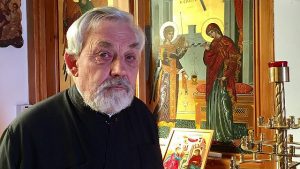As an Orthodox Christian priest, I am always interested in how people find and (sometimes) abandon their Orthodoxy. In a recent conversation with a close friend of mine, we found ourselves reflecting on friends of ours who have risen to prominence in parishes or theological or academic circles, only to ‘implode’ in a variety of ways, even going so far as to abandon their faith in God entirely.
As we speculated on these sad stories, we wondered if they shared something in common, and the conversation turned to the ways in which converts to Orthodox Christianity describe their encounter with the Church. We realized that in all of the stories of conversion, two metaphors are so prevalent as to be ubiquitous—that of the journey and the story. More than that, we saw the ways we tend to understand and apply the metaphors of story and journey have profoundly exacerbated (if not caused) the spiritual breakdowns we have witnessed in the lives of those converts who have lapsed from Orthodoxy.
In pre-modern societies, a person’s identity was forged almost entirely in relation to his tribe. In the context of family and clan, the metaphors of story and journey were well-defined and concrete. The story was the ancestral history—a collection of myths and customs by which the tribe identified itself—and the individual’s purpose was to assimilate himself into this pre-existing narrative. The journey was the process of assimilation, which also had a well-defined markers in the form of rituals of birth, coming-of-age, marriage, the making of war, the establishing of peace, and death.
By their communal nature, tribal societies guaranteed the safety of the metaphors of story and journey. Individuals journeyed into a story their community had defined, on a journey their ancestors had taken before them.
By contrast, modern societies have consciously abandoned the tribe as the locus of personal identity. Since the industrial revolution, the tie between the individual and their community has largely been severed. Detached from these roots, our understanding of the metaphors of story and journey have also become unmoored. While the tribal story was collectively known and understood and handed down from generation to generation, now we have no narrative to adopt, and are compelled to create our own myths from which to draw meaning. While the journey that one undertook to become part the tribal story was well-established in communal rites and rituals, now we must invent not only the destination (whatever constitutes personal fulfillment), but also the route and the markers of meaning along the way.
I think of myself as a typical example of this modern situation. Upon learning that I am an Eastern Orthodox priest, people have often asked whether I am ethnically Slavic. The question itself is telling: the assumption is that I entered the priesthood because it is my tribal religion. In reality, I was born in the Seychelles, raised in southern and eastern Africa, and immigrated to western Canada. I chose to attend an Orthodox Church independently of my family, who found my decision strange and alienating. Far from being an inevitable step in the fixing of my tribal identity—a Slavic boy following taking up the clerical family business—my entering the priesthood was very personal: my journey, a development in my story. In a pre-modern society, I could not have conceived of such a path. Modernity has allowed me to make the kinds of social decisions that led to what I have become.
In one sense, then, we converts can be grateful for the breakdown of tribally-defined barriers that the modern ethos has afforded. For one thing, it has made it possible for us to discover a rich Orthodox spiritual heritage that would otherwise have remained sequestered in Slavic, Greek or Palestinian tribal ghettos. At the same time, the detaching of the individual from the tribal in the forging of spiritual identity has a dark side, and it is this that I would like to draw our attention to here. For the very same modern phenomenon that has permitted some of us to discover a faith that would otherwise have been concealed from us also contains within itself a set of assumptions that, as long as we ignore them, could lead us to abandon the same faith almost readily as we embraced it.
Consider the metaphor of the journey to faith. As long as we accept as axiomatic that the individual is on a personal journey whose destination is self-defined and determined, two assumptions follow. Firstly, we come to assume that every destination is equally valid. Secondly, because each individual is on his own journey, we assume that he must know the best way to get where he is going; to that extent, we tend to regard whatever path he chooses as the right one relative to him.
Similar assumptions may be made when we as moderns interpret the story metaphor. If we believe that the individual must conceive his own story, rather than simply appropriate the tribal story, then forging our identities primarily involves conceiving of and articulating a myth that is uniquely our own. Rather than asking how we fit into the story that we have inherited, we ask how our experiences fit into a story whose lines are necessarily in flux, developing according to our subjective inclinations. As a result, we make choices, not so that we can better approximate our place in the communal narrative, but on the basis of whether or not we believe that those choices fit into a narrative we have constructed.
These approaches to the metaphors of journey and story are potentially dangerous for the modern Orthodox convert. If every spiritual destination is valid, why should one’s encounter with Orthodoxy be the end point, and not simply a temporary stop along the way to somewhere else, equally fulfilling? And if every path one chooses is right as long as you consider it a part of ‘your journey,’ then Orthodox Christianity, which considers itself the fullness of the way to human salvation through Jesus Christ, is no more right than any other system that claims to offer spiritual guidance in human life.
Likewise, when we make our encounter with the Orthodox Church merely a part of ‘my story,’ we build in the possibility that the encounter may not be the ‘end,’ but rather just one chapter, to be followed by others. And if our life in the Orthodox Church starts to involve uncomfortable, inconvenient and even unpleasant experiences that don’t ‘fit’ our notions of how things should unfold; if our newly-adopted Orthodox narrative comes into conflict with other narratives, such as those of the LGBT or feminist communities—what then? Might we not be tempted to turn the page on Orthodoxy and ‘start a new chapter’ in our lives, seeking to weave in the alternative plotlines we find so personally compelling?
In short, when we uncritically adopt the modern interpretation of these key metaphors, we unwittingly allow for the possibility of reducing Christianity to a purely subjective faith whose staying power depends on our fickle notions of ‘personal fulfillment.’ Planted in such rocky soil, our spirituality may quickly and joyfully spring to life when it suits us, but lacking a root, it may wither and die just as quickly.
The antidote to this malaise would seem to involve restoring a tribal basis for personal identity. However, this too is fraught with pitfalls. Too often, especially in convert circles, the return to tribalism has devolved into sectarianism as members, perhaps unconsciously aware of their modern spiritual fragility, adhere to communal rules that focus on externals (such as beards, head coverings and so on), while adopting a rigid formalism and literalism in their interpretation of liturgical and biblical texts. In this way, they hope to restore the understanding of journey and the story to its pre-modern state, containing the destructiveness of individual autonomy that modernity has unleashed.
The dangers here are relatively obvious. Aside from robbing a rich spiritual tradition of its depth and nuance, reducing it to a collection of mere forms to be observed unquestioningly and unthinkingly, such sectarian endeavours inevitably deprive the Gospel of its power to penetrate and overcome cultural, social, economic and religious barriers. Quite simply, the artificial and superficial restoration of tribalism that we see in many convert communities perverts the apostolic understanding of a Church and a unity in Christ where there is truly neither Jew nor gentile, slave nor free, male nor female.
Rather than applying such simplistic answers to the question of modernity, we must begin by confronting the extent to which modernity has shaped and continues to shape our sensibilities, regardless of whether we brand ourselves ‘conservative’ or ‘liberal.’ Second, we must actively engage in reclaiming the metaphors of story and journey, rather than simply adopting them wholly and uncritically. We can and should celebrate the power of modernity to break down barriers and allow the Gospel to flourish in places from it would otherwise be excluded; however, we should avoid its tendency to relativize and render all things equally valid (and therefore equally meaningless).
If we are to talk about a ‘journey of faith’ (and not to do so would be difficult), we need to consciously recall that the destination—the fullness of Christ—is a given, as is the way to get to that destination in the tradition of the one apostolic Church. The paths we take, therefore, are not all equally valid or good, but must prove themselves consistent with the path of the saints—those who have walked before us.
Similarly, if we must think of our journey as being a part of a larger narrative, we need to remind ourselves both individually and collectively this is not a narrative of our own making; it too is a given. Our responsibility is not to continually deliberate on how the events and experiences of our lives ‘fit’ into the myth we have created for ourselves. Rather, our task is to make the most informed and wisest choices in council with the Body of which we are members, and then leave the Head of that Body, the Author of lives to establish their ultimate significance in relation to His story, the story of universal salvation.




















